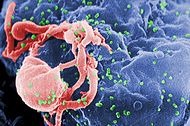Published on January 9, 2013 by Paul Tinder
Injecting heat-inactivated human immunodeficiency virus may stimulate the immune system in some patients, allowing for the temporary freedom from drugs, according to a recent study.
Felipe Garcia, the study’s co-author and an infectious disease physician at the University of Barcelona, said that the combination of immune system cells – dendritic cells – and inactivated HIV, aroused the immune system to attack the live virus that circulated in the bodies of patients.
The research team selected 22 patients at random and administered a vaccine of the patients’ own dendritic cells and their inactivated HIV. Twelve of the 22 patients experienced a 90 percent drop in virus levels over 12 weeks. The immunity to HIV diminished and virus levels eventually increased. After 48 weeks, only three participants receiving the experimental vaccine maintained the 90 percent virus level drop.
Patients in the control group who received unchanged HIV and dendritic cells appeared to receive little benefit. Before the study, all participants were receiving treatment with standard antiretroviral therapy.
Garcia suggested that a therapeutic vaccine could be beneficial, even if it only offered temporary effects. He said that dropping virus levels down extremely low could mean the patients would not need drugs, would not show symptoms and would be unlikely to transmit the disease to others.
The study was published in a January edition of Science Translational Medicine.

No comments:
Post a Comment